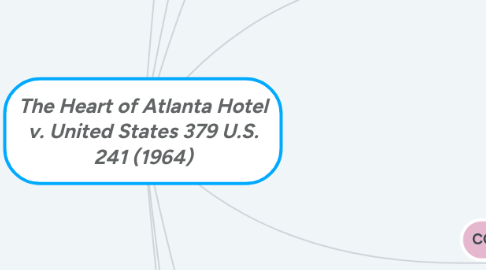
1. FACTS
1.1. Parties
1.1.1. The Heart of Atlanta Hotel
1.1.2. The United States Supreme Court
1.2. What Happened
1.2.1. The owner of The Heart of Atlanta Hotel (appellant), a 216-room hotel in Atlanta Georgia, refused to rent rooms to African-American patrons.
1.2.2. This was in direct violation of the Civil Rights Act of 1964
1.3. Procedural History
1.3.1. Moreton Rolleston, the owner, filed suit in federal court claiming that the Civil Rights Act did not grant Congress the authority to govern interstate commerce.
1.3.1.1. The United States countered these claims and argued that The Constitution's Commerce Clause required adequate accommodation for African-American interstate travelers.
1.3.1.1.1. The Supreme Court ruled in favor of Congress stating that they did not unconstitutionally exceed rights awarded by the Commerce Clause in Title II of the Civil Rights Act of 1964
1.3.1.2. The United States further argued that the Fifth Amendment did not violate the "Eminent Domain" Act and the Plaintiff was not due "compensation" or due process of law.
1.3.2. Rolleston also claimed that his Fifth and Thirteenth Amendment Rights were violated by said injunction.
2. ISSUE BEFORE THE COURT
2.1. Whether Congress was legally enacting the law (in a previous ruling in the Northern District Court of Georgia) as described by a) The Commerce Clause of The Civil Rights Act of 1964, b) denying the plaintiff his Thirteenth Amendment Rights, by requiring the owner of The Heart of Atlanta Hotel to provide equal service to customers of any ethnicity.
3. RULE OF LAW
3.1. Determine proper interpretation of the Commerce Clause of The Civil Rights Act of 1964.
3.2. Determine the proper interpretation of the Fifth Amendment as pertaining to legal operation of private businesses and their rights to deny service to any customer and operate their business as they wish. Further the plaintiff claimed that his denial of these rights should award due compensation under the Eminent Domain Clause.
3.2.1. The plaintiff must show that his constitutional rights were violated and denied via injunctions issued in a previous ruling by the United States Court in the Northern District of Georgia.
3.3. Determine if Thirteenth Amendment rights were denied to the plaintiff.
4. APPLICATION
4.1. The United States argues that Congress did not misinterpret or exceed power to enforce the Civil Rights Act of 1964 as it applied to private businesses in previous ruling of the United States District Court.
4.1.1. The United States argued that The Heart of Atlanta Hotel was located on two major interstate highways making it a necessary place for potential accommodations for interstate travelers.
4.1.1.1. The United States proved that approximately 75% of the hotel's business was made up of out-of-state customers, making this a matter of interstate commerce.
4.2. The plaintiff had the burden of proving...
4.2.1. Congress unjustly denied him his Fifth and Thirteenth Amendment rights as stated in the U.S. Constitution, through disallowal of racial discrimination in his private business.
4.2.2. Violation of Fifth Amendment Rights allowed him due compensation for the "taking of his business".
5. CONCLUSION
5.1. On December 14, 1964, the U.S. Supreme Court (Supreme Court Justices via Majority Rule) upheld the decision made by Congress to require The Heart of Atlanta Hotel to service clientele of ethnicities.
5.2. It was determined that reasonable regulation of interstate commerce did not constitute the "taking" of property, thus no compensation was needed.
5.3. Lastly, it was determined that no Thirteenth Amendment rights were violated and the plaintiff was not placed in a position of "involuntary servitude", as the this amendment primarily protects citizens from slavery. The plaintiff was free to operate his business or not operate his business, but the operation of his business in accordance with The Civil Rights Act of 1964 did not unjustly force him to serve the United States.
6. IMPACT
6.1. Cases that have cited this holding
6.1.1. 115 S.Ct. 1624 Supreme Court of the United States UNITED STATES, Petitioner v. Alfonso LOPEZ, Jr.
6.1.1.1. Defendant was convicted in the United States District Court of possessing a firearm in school zone in violation of Gun-Free School Zones Act, and he appealed. The United States Supreme Court held that Gun-Free School Zones Act, making it federal offense for any individual knowingly to possess firearm at a place an individual has reasonable cause to believe is a school zone, exceeded Congress' commerce clause authority, since possession of a gun in local school zone was not economic activity that substantially affected interstate commerce. (U.S. v. Lopez. 115 S.Ct. 1624, 1629+, U.S.Tex.)
6.1.2. 120 S.Ct. 1740 Supreme Court of the United States UNITED STATES, Petitioner, v. Antonio J. MORRISON, et al.
6.1.2.1. A university student brought claims under Violence Against Women Act (VAWA) against students who allegedly raped her. The United States District Court for the Western District of Virginia, dismissed claims. The former student appealed. The Supreme Court, held that: (1) Commerce Clause did not provide Congress with authority to enact civil remedy provision of VAWA, inasmuch as provision was not regulation of activity that substantially affected interstate commerce, and (2) enforcement clause of Fourteenth Amendment did not provide Congress with authority to enact provision. Reversing the dismissal. (U.S. v. Morrison 120 S.Ct. 1740, 1749+, U.S.Va.)
7. IMPORTANCE
7.1. A Business professional is affected by these rulings because...
7.1.1. A business is interpreted as a public place making businesses responsible for public law
7.1.2. Though the Fifth Amendment allows business owners the right to refuse service, it does not allow the right to refuse service based on ethnicity. This is an important law for business owners to recognize, particularly those that serve public populations.
7.1.3. The location of a business can dictate which laws a business is expected to follow.
